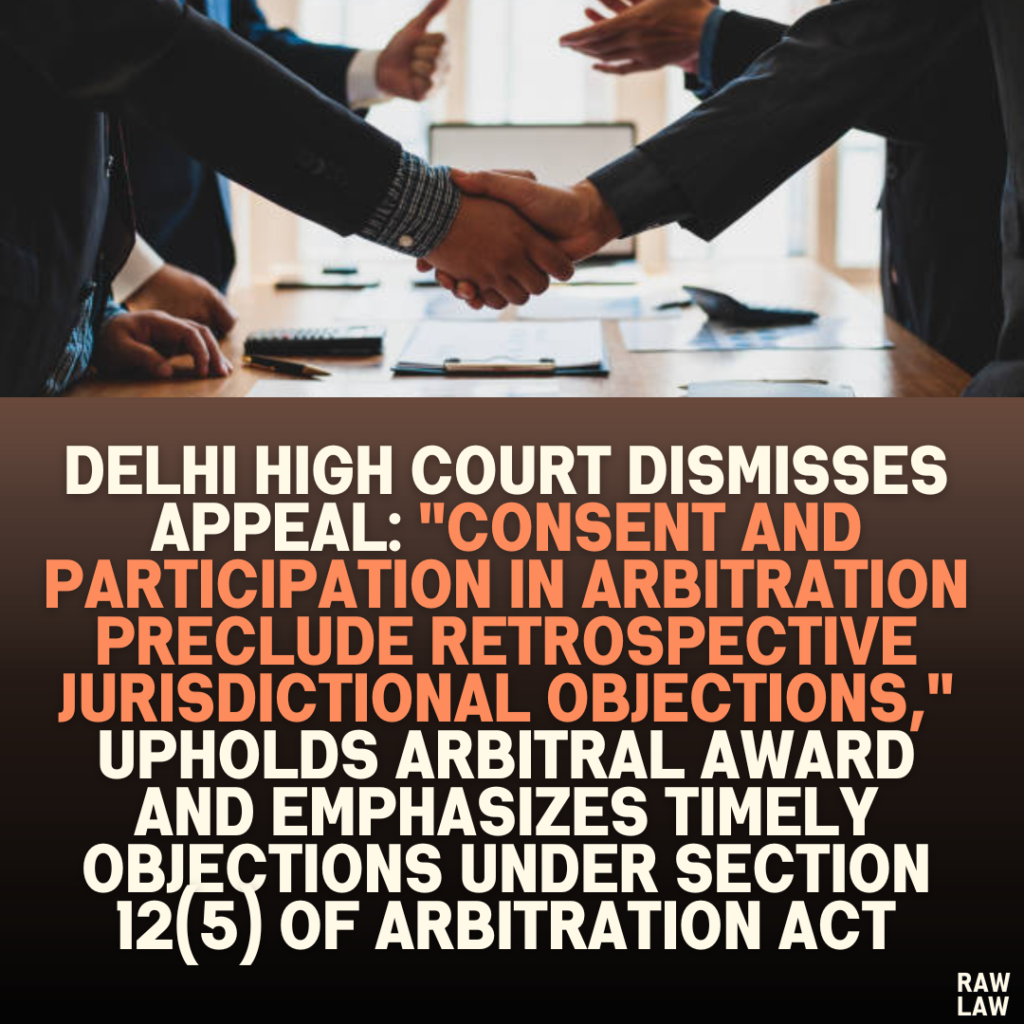Court’s Decision:
The Delhi High Court dismissed the appeal challenging the arbitral award. It held that the appellants’ objections to the arbitrator’s appointment were raised too late in the process and lacked merit. The court emphasized that:
- The appellants had explicitly requested the appointment of an arbitrator by the respondent (AAI) and participated without objection throughout the arbitration process.
- Section 12(5) of the Arbitration and Conciliation Act, 1996, requires any waiver of objection to the arbitrator’s appointment to be in writing and express. The appellants had failed to demonstrate such a waiver or provide substantial grounds for challenging the arbitral proceedings after the fact.
- Allowing a belated challenge would erode the sanctity and efficiency of arbitration as a dispute resolution mechanism.
Facts of the Case:
- Background of the Dispute:
- The appellants entered into a License Agreement with the Airports Authority of India (AAI) in 2010 for providing ground-handling services.
- Clause 78 of the agreement allowed for disputes to be resolved through arbitration, with the AAI Chairman empowered to appoint a sole arbitrator.
- Invocation of Arbitration:
- On 27 November 2015, the appellants invoked the arbitration clause and requested AAI to appoint an arbitrator.
- The AAI appointed Hon’ble Justice S.S. Nijjar (Retd.) as the sole arbitrator.
- Arbitration Proceedings:
- At the first procedural hearing on 22 March 2016, the appellants expressly recorded their consent to the arbitrator’s appointment and raised no objections.
- The arbitration continued for two years, with the appellants actively participating and even filing applications under Section 17 of the Arbitration Act.
- The arbitrator issued a final award on 30 July 2018, rejecting all claims of the appellants.
- Challenge to the Award:
- In their Section 34 petition challenging the award, the appellants did not initially raise any objections to the arbitrator’s appointment.
- However, they later filed an application (IA 1842/2022) claiming that the arbitrator’s appointment was unilateral and violated Section 12(5) of the Act.
Issues Before the Court:
- Whether the appellants could challenge the jurisdiction of the arbitrator after having explicitly consented to the appointment and participated in the proceedings.
- Whether the absence of a written waiver under Section 12(5) of the Arbitration Act invalidated the arbitral proceedings and the award.
Petitioner’s Arguments:
- Unilateral Appointment:
- The appellants argued that the AAI’s unilateral appointment of the arbitrator violated Section 12(5), which prohibits such appointments.
- They relied on judgments like Bharat Broadband Network Ltd. v. United Telecoms Ltd. and Perkins Eastman Architects DPC v. HSCC (India) Ltd., which held that unilateral appointments are invalid under the Act.
- No Written Waiver:
- They contended that any waiver of Section 12(5) must be express and in writing. Since no such waiver was given, the proceedings were void ab initio.
- Consent Recorded Incorrectly:
- The appellants suggested that their consent to the arbitrator’s appointment, as recorded in the procedural order, could not constitute an express written waiver.
Respondent’s Arguments:
- Participation Without Objection:
- The AAI argued that the appellants had themselves requested the appointment of an arbitrator and raised no objections during the proceedings or in their initial challenge under Section 34.
- They claimed the appellants’ belated objections were motivated solely by their dissatisfaction with the award.
- Validity of Appointment:
- The respondents emphasized that the arbitrator was appointed as per the agreement and with the appellants’ consent, fulfilling the procedural requirements under the Arbitration Act.
Analysis of the Law:
- Section 12(5) Requirements:
- Section 12(5) of the Arbitration Act, introduced in 2015, invalidates unilateral appointments of arbitrators unless there is an express waiver by the parties in writing.
- The court clarified that such a waiver must demonstrate the parties’ unequivocal intention to forego their rights under the provision. Mere participation or implied consent does not suffice.
- Conduct of the Parties:
- The appellants’ consistent participation in the arbitration, including the filing of applications under Section 17, indicated their acceptance of the arbitrator’s jurisdiction.
- No objections were raised even after the introduction of Section 12(5) or in the original Section 34 petition challenging the award.
- Precedent Analysis:
- The court distinguished the present case from Bharat Broadband and Perkins Eastman, where objections to unilateral appointments were raised in a timely manner.
- Here, the appellants raised objections only after the unfavorable award, undermining their credibility and the integrity of the arbitration process.
- Principle of Acquiescence:
- The court emphasized that arbitration relies on the principle of consensus. By failing to object at any stage, the appellants effectively acquiesced to the arbitrator’s jurisdiction.
Court’s Reasoning:
- The appellants themselves invoked the arbitration clause and requested AAI to appoint an arbitrator. This constituted implicit consent to the appointment.
- The procedural order recording their consent was not challenged at the time, and no evidence was provided to suggest that it was improperly recorded.
- Allowing a belated challenge would undermine the efficiency and finality of arbitration. The court observed, “To permit such a challenge would erode the sanctity of the arbitral process and do a disservice to its institution.”
Conclusion:
The court dismissed the appeal and upheld the arbitral award. It ruled that:
- The appellants could not retrospectively challenge the arbitrator’s jurisdiction after having participated without objection.
- A waiver under Section 12(5) requires an express agreement in writing, but the appellants’ conduct and procedural history indicated a clear acquiescence to the arbitrator’s appointment.
Implications:
- This judgment reinforces the principle of timely objections in arbitration proceedings.
- It affirms the importance of Section 12(5) while clarifying that mere participation without a written waiver does not render the provision inapplicable.
- The decision bolsters the integrity and efficiency of arbitration as a preferred mode of dispute resolution.




Pingback: Supreme Court Quashes FIR and Chargesheet in Dowry Harassment Case: "Allegations Found Vexatious, Filed with Ulterior Motive After Divorce Proceedings" - Raw Law